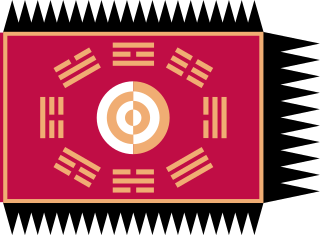Government
Name:
The House of Saud
Flag/Badge:

Head of State:
Faisal bin Turki Al Saud
Head of Government:
Same as Head of State
Ideology:
Wahhabist
Military
Army Numbers:
6,000
Navy Numbers:
None
Army Equipment:
Naval Ship Types:
Nonelol
History, Expansion, and Economics
History:
The origins of the House of Saud go back to the mid 15th century, when the Mrudah clan of bedouins settled in the city of Diriyah in central Arabia. The Mrudah clan would grow in size and power and eventually come to rule Diriyah itself, which came to grow and prosper in proportion to the strength of clan Mrudah. As the clan grew though so did its ambitions and the ambitions of cliques within it. And as the old Bedouin proverb goes, “I against my brother, I and my brother against our cousin, I, my brother and our cousin against the neighbors” the clan split along lines of interest, with one sect leaving for Iraq, and the other coalescing around Sheikh Saud ibn Muhammad ibn Muqrin and thus the House of Saud would be born.
The independent of the House of Saud would however not come until the 18th century when the rise of the Wahhabist sect of Sunni Islam swept Arabia. Angered at Ottoman ambitions to declare themselves the Caliph – defenders – of Islam, the Wahhabi movement was critical of the Ottomans for their boldness and even of their decadence. While Muhammad ibn Abdul Wahhab himself was never publicly inflammatory towards the Ottomans, his political followers in the House of Saud were so bold as to be publicly against the Ottomans. Though nominally a vassal of the Ottoman Empire, the Arab house engaged in years of low-level broiling war with the Ottomans raiding into Iraq and the Levant from their home in the harsh deserts of central Arabia, though controlling the entire peninsula at the time save for the Rub al-Khali, Oman, and Yemen.
Though the conflict with the Ottomans was at a low level, best described as grudges by one vassal against another, it was by no means insincere. Propelled by a combination of religious fervor and state building self-interest the Saudi war against the Ottomans entailed the cleansing of Arabia, attacks against the Iraqi city of Karballah and the destruction of its Shia shrines, and strict control of Medina and Mecca, banning the playing of drums and musics by pilgrims from Egypt, Syria, and beyond. Despite the violence, this was met with esteem and support by the peoples of Arabia who saw the strict Orthodox tendencies of the House of Saud a blessing and a matter of good rule. But to the House of Osman, this became a threat.
In 1811, growing tired of the aggression of the Saudis, the House of Osman declared war on them and ordered Muhammad Ali of Egypt to invade Arabia and deal with the problem posed by the Wahhabists. Muhammad Ali sent his son Ibrahim Pasha to put down the rebellion and over the course of seven years a slow campaign across the deserts of Arabia was initiated, involving the destruction of cities and the extermination of populations as the House of Saud scrambled to mount a defense against the Egyptians. Eventually, the war would come to an end at Diriyah, where the garrison and population was exterminated, and the walls and trenches of the city leveled and filled in. The Ottoman-Egyptian forces, decimated the Arabians and capturing the last Emir-Imam Abdullah bin Saud of the First Saudi State, sent him to Istanbul to be executed and his corpse displayed publicly as a then warning against further rebellion.
This though, did not kill the House of Saud.
Though scattered remnants remained and the last man capable of taking leadership of the house, Turki bin Abdullah Al Saud who was able to flee Diriyah before its destruction, living in exile in the desert before eventually leaving for India to seek refuge. His son Faisal bin Turki Al Saud was taken to Egypt by Ibrahim Pasha as a captive, where through lacking importance compared to Abdullah bin Saud was permitted to live for a time in soft exile in Egypt, before returning to Arabia, and on invitation from his father himself left for India.
In India, the remnants of the House of Saud gathered around the court of the Empire of the Sikhs as refugees. There they were clothed and sheltered and even began new military careers in the Sikh army. Though leading small parts, the refugees of the House of Saud showed admirable bravery in the war in Afghanistan. The Sauds also made a popular decision to back the Sindhanwalias in Sikh internal politics.
Though austere, the differences in Saudi belief in Wahhabism has not seen them alienated among the Sikhs who find only their belief in austere modesty a humorous modesty reminiscent of the gurus of the Indian subcontinent. While shunning decadence the family in India practices many of the virtues of the Islamic faith in charity and faith and has carved out a niche and a following in Punjabi society which has allowed the House of Saud to reconstruct a small military base in India that they someday dream of bringing back with them to Arabia, and lay out revenge against the Egyptians and Ottomans that decades ago so annihilated their people.
Despite the distance all the same, they maintain contact with the rest of their clan in Arabia and with the people through letters, and Faisal bin Turki Al Saud has inherited the practice of his father Turki bin Abdullah as a poet and a letter writer, regularly writing missives about his love for Arabia and his desire to return to its deserts and mountains. He remains in close contact with the chiefs of the high deserts of Nejd and beyond and close Saudi family still living in the area, which after the war still maintains a nominal political presence in Arabia, as the immediate and organized Wahhabist resistance to the foreigners has for the time being, been laid low.
As the proverb goes:
“I against my brother, I and my brother against our cousin, I, my brother and our cousin against the neighbors, All of us against the foreigner.”
Territory:
Effectively as an independent polity: none.
As local provincial rulers in Egypt: Nejd
Economic Description:
The basic economy of Nejd was nearly decimated by the Nejd Expedition during the Ottoman-Wahabbi War, where in many of the settlements visited by the armies many of the men over the age of ten were executed and much of the infrastructure destroyed. Though cities like Diriyah enjoyed a vibrant agricultural life blessed upon the region by the Wadi Hanifa.
Historical Claims:

Name:
The House of Saud
Flag/Badge:

Head of State:
Faisal bin Turki Al Saud
Head of Government:
Same as Head of State
Ideology:
Wahhabist
Military
Army Numbers:
6,000
Navy Numbers:
None
Army Equipment:
- 1836 Brunswick Rifles
- Jezali Pattern Rifles
- 1829 Delvigne Rifles
- Kilij
- Old Turkish muskets
Naval Ship Types:
Nonelol
History, Expansion, and Economics
History:
The origins of the House of Saud go back to the mid 15th century, when the Mrudah clan of bedouins settled in the city of Diriyah in central Arabia. The Mrudah clan would grow in size and power and eventually come to rule Diriyah itself, which came to grow and prosper in proportion to the strength of clan Mrudah. As the clan grew though so did its ambitions and the ambitions of cliques within it. And as the old Bedouin proverb goes, “I against my brother, I and my brother against our cousin, I, my brother and our cousin against the neighbors” the clan split along lines of interest, with one sect leaving for Iraq, and the other coalescing around Sheikh Saud ibn Muhammad ibn Muqrin and thus the House of Saud would be born.
The independent of the House of Saud would however not come until the 18th century when the rise of the Wahhabist sect of Sunni Islam swept Arabia. Angered at Ottoman ambitions to declare themselves the Caliph – defenders – of Islam, the Wahhabi movement was critical of the Ottomans for their boldness and even of their decadence. While Muhammad ibn Abdul Wahhab himself was never publicly inflammatory towards the Ottomans, his political followers in the House of Saud were so bold as to be publicly against the Ottomans. Though nominally a vassal of the Ottoman Empire, the Arab house engaged in years of low-level broiling war with the Ottomans raiding into Iraq and the Levant from their home in the harsh deserts of central Arabia, though controlling the entire peninsula at the time save for the Rub al-Khali, Oman, and Yemen.
Though the conflict with the Ottomans was at a low level, best described as grudges by one vassal against another, it was by no means insincere. Propelled by a combination of religious fervor and state building self-interest the Saudi war against the Ottomans entailed the cleansing of Arabia, attacks against the Iraqi city of Karballah and the destruction of its Shia shrines, and strict control of Medina and Mecca, banning the playing of drums and musics by pilgrims from Egypt, Syria, and beyond. Despite the violence, this was met with esteem and support by the peoples of Arabia who saw the strict Orthodox tendencies of the House of Saud a blessing and a matter of good rule. But to the House of Osman, this became a threat.
In 1811, growing tired of the aggression of the Saudis, the House of Osman declared war on them and ordered Muhammad Ali of Egypt to invade Arabia and deal with the problem posed by the Wahhabists. Muhammad Ali sent his son Ibrahim Pasha to put down the rebellion and over the course of seven years a slow campaign across the deserts of Arabia was initiated, involving the destruction of cities and the extermination of populations as the House of Saud scrambled to mount a defense against the Egyptians. Eventually, the war would come to an end at Diriyah, where the garrison and population was exterminated, and the walls and trenches of the city leveled and filled in. The Ottoman-Egyptian forces, decimated the Arabians and capturing the last Emir-Imam Abdullah bin Saud of the First Saudi State, sent him to Istanbul to be executed and his corpse displayed publicly as a then warning against further rebellion.
This though, did not kill the House of Saud.
Though scattered remnants remained and the last man capable of taking leadership of the house, Turki bin Abdullah Al Saud who was able to flee Diriyah before its destruction, living in exile in the desert before eventually leaving for India to seek refuge. His son Faisal bin Turki Al Saud was taken to Egypt by Ibrahim Pasha as a captive, where through lacking importance compared to Abdullah bin Saud was permitted to live for a time in soft exile in Egypt, before returning to Arabia, and on invitation from his father himself left for India.
In India, the remnants of the House of Saud gathered around the court of the Empire of the Sikhs as refugees. There they were clothed and sheltered and even began new military careers in the Sikh army. Though leading small parts, the refugees of the House of Saud showed admirable bravery in the war in Afghanistan. The Sauds also made a popular decision to back the Sindhanwalias in Sikh internal politics.
Though austere, the differences in Saudi belief in Wahhabism has not seen them alienated among the Sikhs who find only their belief in austere modesty a humorous modesty reminiscent of the gurus of the Indian subcontinent. While shunning decadence the family in India practices many of the virtues of the Islamic faith in charity and faith and has carved out a niche and a following in Punjabi society which has allowed the House of Saud to reconstruct a small military base in India that they someday dream of bringing back with them to Arabia, and lay out revenge against the Egyptians and Ottomans that decades ago so annihilated their people.
Despite the distance all the same, they maintain contact with the rest of their clan in Arabia and with the people through letters, and Faisal bin Turki Al Saud has inherited the practice of his father Turki bin Abdullah as a poet and a letter writer, regularly writing missives about his love for Arabia and his desire to return to its deserts and mountains. He remains in close contact with the chiefs of the high deserts of Nejd and beyond and close Saudi family still living in the area, which after the war still maintains a nominal political presence in Arabia, as the immediate and organized Wahhabist resistance to the foreigners has for the time being, been laid low.
As the proverb goes:
“I against my brother, I and my brother against our cousin, I, my brother and our cousin against the neighbors, All of us against the foreigner.”
Territory:
Effectively as an independent polity: none.
As local provincial rulers in Egypt: Nejd
Economic Description:
The basic economy of Nejd was nearly decimated by the Nejd Expedition during the Ottoman-Wahabbi War, where in many of the settlements visited by the armies many of the men over the age of ten were executed and much of the infrastructure destroyed. Though cities like Diriyah enjoyed a vibrant agricultural life blessed upon the region by the Wadi Hanifa.
Historical Claims:











